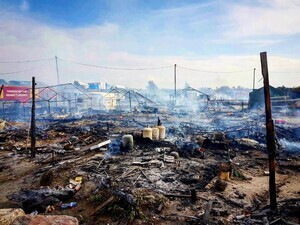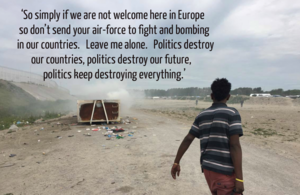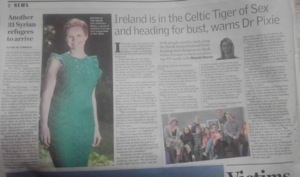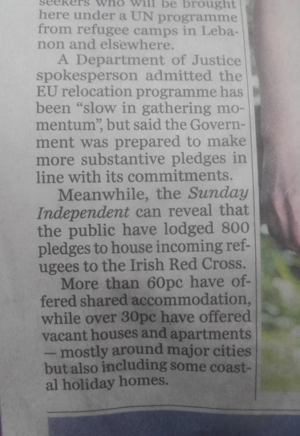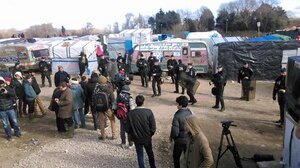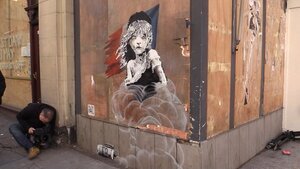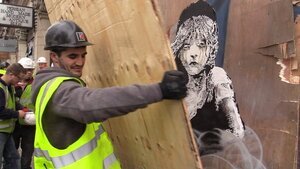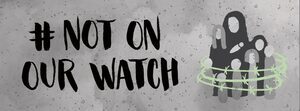
Tomorrow night.
Outside the Kildare Street entrance to Dáil Éireann, at 7pm.
The Not On Our Watch campaign are holding a vigil to coincide with a Dáil debate on the group’s call for Ireland to welcome 200 unaccompanied children from the refugee camp, The Jungle, in Calais northwest France.
The campaign writes:
Ireland’s response to the unprecedented global displacement of men, women and children as a result of numerous wars has been almost non-existent. The French government recently demolished most of The Jungle however almost 1,500 children remain in precarious circumstances in the camp. The Irish government must represent the wishes of it’s people, 800 of whom last year offered to give a home to unaccompanied refugee children.
Not On Our Watch, backed by the Irish Congress of Trade Unions, many NGOs including the Irish Refugee Council, the Children’s Rights Alliance, the Immigrant Council of Ireland and Sister Stan Kennedy have called on the Irish government to immediately act to help 200 of those children and relocate them to Ireland.
We are calling for people to please attend at the Dáil (Kildare Street entrance) and bring your children along. Our supporters are asking their children to make “2♥♥” signs and to hold them up for the politicians to see as they enter the Dáil for the debate. As it will be dark we also ask you to bring candles. It is important that our children know that we did not let unaccompanied refugee children down – Not On Our Watch.
Not On Our Watch (Facebook)
Thanks Gary Daly
Meanwhile…


Justice Minister Frances Fitzgerald and Independents4Change TD Clare Daly in a meeting of the Joint Committee on Justice and Equality on October 5
On Wednesday, October 5, the Minister for Justice Frances Fitzgerald appeared before the Oireachtas Joint Committee on Justice and Equality to discuss the UN Summit on Refugees and Migrants.
This was before the demolition of the makeshift refugee camp in Calais, France.
From the meeting, Ms Fitzgerald had the following exchange with Independents4Change TD Clare Daly…
Clare Daly: “… we get nice statements and lofty aspirations but the reality on the ground is rather different. We have heard a great deal from the Government about the thousands we are taking in, how the numbers are far beyond any commitments given and so on. The reality is, as the Minister of State, Deputy [David] Stanton, said last month, 486 people have been resettled in Ireland, 69 of whom came from Greece while none has come from Italy. The figure includes one unaccompanied minor. This is despite the Minister’s public commitment that this would be a priority area.
I hate talking about numbers because we are talking about human beings, each of whom has to endure a horrendous journey to get to these outposts of Europe. They bring the legacy of a life almost annihilated. It is not even clear to me what the figures are. For example, the Minister of State, Deputy Stanton, said previously that of the 4,000 only 2,622 persons would be relocated from Italy and Greece, while the others would come on the family resettlement programme. That is deeply troubling given the manner in which we are implementing that programme already. For example, I am aware of a Syrian who lives here with Irish friends and who has been trying to relocate some of her family to Ireland under family reunification provisions. Such has been the concern of some friends in Ireland that they have travelled to Greece to assist this woman to be reunited with her family. They have been through extreme trauma. Anyway, they have been unable to do what they set out to do.
The stories from the people on the frontline do not back up the points made to the effect that it is a bureaucracy operated by the Greeks and Italians and it is all their fault. Moreover, they do not correspond to Deputy [Alan] Farrell’s version to the effect that no one wants to come to Ireland anyway. That is not what Irish volunteers are saying. They have been in Greece and Lebanon. To a man and to a woman the story they come back with is that no one there is aware of Ireland.”
“There is zero recognition of Ireland as a destination. Irish volunteers have gone to every camp in Lebanon. They have seen hardly any presence of Irish people there, albeit they are not there all the time. They have interviewed people with the help of interpreters. In the case of each of the sites, the people there simply did not know about Ireland, the type of country it was, whether they would be welcome or anything like that. Deputy Wallace and I went to Calais. Given the geography and given that Ireland is a small country, many people do not realise that Ireland is an English-speaking country. However, language is one of the key reasons the people in Calais want to go to England. They do not realise how the system works.”
“The approach taken to family unification has been adversarial rather than a sensitive or sympathetic approach. I put it to the Minister that she has considerable latitude in this regard. Ultimately, the decisions are taken by the Minister and she has discretion. Why does she not intervene and exercise that discretion?”
“The Minister has made public statements to the effect that addressing the question of unaccompanied minors would be a priority. This is a real area of concern, especially given the decision of the French Government to shut down “the jungle” later this month and the fact that France has said it cannot accommodate more than 250 of the unaccompanied minors there. There is potential for hundreds of children to be lost and unaccounted for.”
“I want to know what we are doing in that regard. What accommodation is available for these children? We have tried to pursue this with Tusla and we have asked how the agency is dealing with these matters. The Minister has spoken publicly of the extraordinary and generous offers by the public of accommodation and taking on children. All of that is true but it is not being processed. Where are the log-jams in that placement? For example, Tusla has said it has vetted three people for foster care arrangements.”
“I and others have said publicly that we would be happy to put ourselves forward to care for an unaccompanied minor and to be vetted and so on. If we were to publicly advertise these schemes I believe there are large numbers of Irish people who would be willing to participate and it could happen at no extra expense to the State. It could alleviate the trauma those children are experiencing. Why not establish a temporary consulate and humanitarian visa scheme? We could bring some of those children here. They are in imminent danger.
“I am conscious of the time and I would like to discuss this more. We have not done enough and there are things we could do if we had the will. It would be great if we did something to stand out in terms of our dealings with the hot spots. For example, there are 18 places for unaccompanied minors at the moment. That is completely and utterly inadequate when it comes to the assessment of facilities here. There should be at least 100 places. Berlin, which has a population of 3.5 million people, has 900 residential places for unaccompanied children. We need to do far more. I am embarrassed and ashamed as an Irish person because of how little we have done. I do not think it is bureaucracy or that people do not want to come to Ireland. They know where it is and if we went out and promoted ourselves, there are many who would take the arm off you for the right to come.”
Frances Fitzgerald: “The Deputy is questioning the commitment of Ireland to respond to refugees but she must understand that we are part of the international response. We are working with an international and European response and we have given a commitment to bring in refugees. The Deputy is not alone in her feelings and every one of us who sees the work our Naval Service is doing and the plight of unaccompanied minors, wants to respond as fast as possible. We all care and want to do the very best we can.
The Deputy is wrong about a number of things. We have people on the ground and Ireland has the fourth or fifth highest staff numbers working on our current response. Calais is not included in our resettlement programme.
Daly: “I did not say it is.”
Fitzgerald: “It raises hugely complex issues. According to Greek figures and in terms of numbers taken for resettlement up to 28 September 2016, Lichtenstein is ahead of us, as are Norway, Luxembourg, Austria, Finland, Iceland and Malta. However, we are not a frontline country with people arriving on our shores. However, we are absolutely committed to taking the numbers I have outlined within the structures of the EU. It has been a slow start and I regret that but it is outside my control or that of Government. Nevertheless, the procedures are in place and staff teams from the Department of Justice and Equality are going out to refugee camps to identify people. We are working with Greece to ensure that people know Ireland is an English-speaking destination. The numbers are increasing now and will rise very significantly.
“We have only dealt with several hundred to date but those people have come into our emergency reception centres, they have received English language training and have been put in contact with local services. They have moved out to communities across Ireland and they are now beginning the integration process. There is an absolute commitment to meet the targets we set.”
“I take the Deputy’s point that the scale of this is appalling. We must ask if there is more we can do and also what else we could be doing. We are open to reconsidering the numbers next year but our first commitment is to take the numbers we said we would take within the EU scheme. We have spoken to the Greek authorities about identifying young, unaccompanied minors. Deputy Clare Daly has the numbers for Calais but we are not working in Calais.
“We are, however, working with the Greeks to identify young unaccompanied minors. Some significant issues arise in respect of unaccompanied minors. The first one of these is identifying them and many of those who were initially identified as unaccompanied minors were actually 19, 20 or 21. This is a problem that is recognised by all groups carrying out assessments in Greece.”
“I have spoken to the CEO of Tusla and that organisation has a commitment to take unaccompanied minors. We are in the process of identifying them and we want to do the very best for them. We believe the best thing would be to have foster homes for them but there is a shortage of foster carers in Ireland at the moment. We must do everything we can to encourage more people to become foster parents. I am advised that unaccompanied minors will begin to arrive shortly and will be placed in foster care.
“The Deputy said that nothing had been done in terms of a public response but that is incorrect. I chaired a meeting on Monday at which the Red Cross was represented. That organisation has worked with all the people who have offered pledges and it has identified people who are willing to supply housing. Some very difficult issues arise in the context of pledges which come in from the public.”
“It is not the role of this committee to go into huge detail on them but the Red Cross has done very significant work in the past number of months with people who have given pledges, many of whom offered accommodation for three months or a year. We need to consider the sustainable issues around that and where refugees go afterwards. They will be citizens at that point, actually, but the question remains of where they go when their accommodation ceases to be available after a year or so. Local authorities were also at the meeting on Monday and they are giving a very significant response, as evidenced by the numbers who have already gone through the emergency reception centres. Insurance issues arise and there are health and safety issues.”
“The Red Cross has now got to the point where it can say there are a certain number of houses available for the refugees who are coming in. A total of 640 have been supplied already and I think the figure for pledges from the public is approximately 160. The Red Cross is working assiduously with the Department and other stakeholders to make sure that, as refugees arrive, they will be in a position to utilise those pledges. The Deputy is wrong to say that the work is not being done. The work is being done by the Red Cross. There is a huge amount of detail in this work. It is one thing for the public to respond to what they saw on the beaches of southern Greece but it is quite another thing to put in place a system whereby we can use the pledges we have received.”
“The churches are also involved in offering accommodation and that is also being worked through with the church representatives. I held a meeting with them and the Minister of State at the Department of Justice and Equality, Deputy Stanton, is doing a huge amount of work in this area. There has been a slow start, not to our resettlement programme but to our relocation programme. People are now arriving every month, however, in increasing numbers.”
“This will test the systems and we will have to make sure that our education system and our health system respond locally to the needs of the refugees. These needs are complex, as anybody who has met Syrian refugees in this country or any group of families will know. Young men who have spent four or five years in refugee camps and are now trying to rebuild their lives have very complex health needs. We have met the Departments of Health and Education and Skills to ensure we have a proper response to all these issues.”
“I understand the Deputy’s frustration and that she wants to do more but the work is under way and we will meet our commitments. We are meeting them now in an accelerating way. The Deputy also asked about family reunification, for which people who arrive here are eligible. Many of the 4,000 who are arriving are families and a ratio is built into the system for applications made for family reunification on the part of people whose families are not with them.”
Daly: “I wish to correct the record on one point. People can be doing things but getting nowhere and that is the point I am making. I am not saying that people are doing nothing but I am saying that the Irish presence in the camps is not visible enough, in Greece or in Lebanon. I do not say there is no one there but they are not advertising Ireland. I am not saying, either, that no work was done. However, we have to look at the outcome of the work. We have 10% of the committed numbers. That is all we have taken.”
Fitzgerald: “There is a reason, as I have explained.”
Daly: “If one takes the Red Cross, well over 800 people made offers but now we have 160, which shows there is a roadblock. Many people made offers for unaccompanied minors. It is not just that there are not enough foster carers. There have been no advertisements to seek them.”
“I have no hesitation in saying the relocation and facilities provided for the small number who got here under the scheme are excellent. I could not fault a single thing with the manner in which the people have been treated when they got here. However, the issues are the numbers are not getting in and there are roadblocks which need to be removed.”
“Irish people working in Calais have done an assessment of the situation. We have given a report on this to the Tánaiste and Minister for Justice and Equality and the Minister for Foreign Affairs and Trade. While we are not compelled to do anything, we can consider it for humanitarian reasons and circumstances.”
Fitzgerald: “There is one correction I want to make. There are 383 currently active accommodation offers which include 280 shared accommodation properties. The balance consists of self-contained properties. This is on the Irish Red Cross side.”
“Deputy Daly claims there are barriers. Some of these are international. No country can take people in without some vetting. There are issues with vetting in Italy, for example. I have explained the international context. Within these constraints, we are working to ensure our pledges are met as quickly as possible.”
“The information I gave to the committee highlights the fact we have the background work done. I am glad the Deputy acknowledged our facilities are excellent. The experience of the couple of hundred refugees who have come here has been very good. The agencies are responding and the numbers will accelerate. The barriers have not been in Ireland but in the hotspots. This is about getting the vetting process working effectively and efficiently. Next time I report to the committee, there will be many more numbers involved.”
Watch back here
Transcript: Oireachtas.ie
Previously: ‘Wouldn’t Hassan’s Children Flourish Here?’
Related: FG’s Regina Doherty says taking Calais minors a ‘no-brainer’ (Kitty Holland, Irish Times)














